

Stress also helps to keep you focused and energetic to meet and deal with challenges. Stress: Why does it happen and how can we manage it? TODAYonline. SINGAPORE — Singaporeans are not only sleep deprived, but they are also among the most stressed at work globally, according to a survey by health service company Cigna released on Tuesday (Mar 26).

Nearly 92 per cent of Singaporeans surveyed were stressed from work, which was higher than the global average of 84 per cent. Of this group, 13 per cent said that the stress they faced was unmanageable. Singaporeans’ physical wellness index also dipped by 4.4 percentage points from last year, which the survey attributed to an increase in sleepless nights. Of the 23 markets surveyed, Singapore had the fifth lowest wellness index, which was measured across five key indices — family, financial, physical, social and work.
Singapore fell by a place from last year as its wellness index went down by 1.7 points to 57.8. The survey collated about 13,200 responses from over 24 countries, with a sample of 502 respondents in Singapore. Read also “Vulnerability will make it seem that you are not as competent. 3 Types of Stress and Health Hazards - Shawna Freshwater, PhD. Stress is a feeling that people have when they are struggling to cope with challenges related to finances, work, relationships, environment, and other situations.
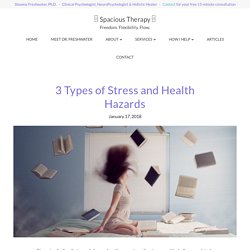
Moreover, stress is felt when an individual perceives a real or imagined challenge or threat to a their well-being. People often use the word stress interchangeably with anxiety, feeling anxious, fearful, nervous, overwhelmed, panic, or stressed-out. Stress is the body’s natural defense against real or imagined danger. It flushes the body with hormones to prepare systems to evade or confront danger. This is known as the “fight-or-flight or freeze” response. The body is an intelligent operating system, but the body can not determine the difference between life threatening external threat from imagined or perceived non-life threatening stressors. The Basics of Stress. Stress is a situation that triggers a particular biological response.
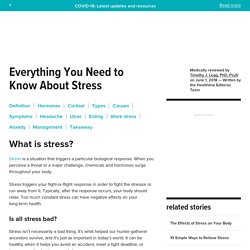
When you perceive a threat or a major challenge, chemicals and hormones surge throughout your body. Stress triggers your fight-or-flight response in order to fight the stressor or run away from it. Typically, after the response occurs, your body should relax. Too much constant stress can have negative effects on your long-term health. Stressed or Depressed? Know the Difference. If you are feeling overwhelmed by stress, you are not alone; it's practically a fact of life on college campuses.
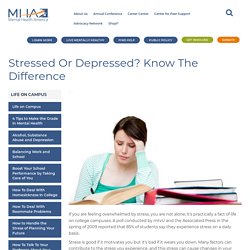
A poll conducted by mtvU and the Associated Press in the spring of 2009 reported that 85% of students say they experience stress on a daily basis. Stress is good if it motivates you but it's bad if it wears you down. Many factors can contribute to the stress you experience, and this stress can cause changes in your body that affect your overall physical, mental, and emotional health. Depression is more serious and long-lasting than stress, and requires a different kind of help. In a 2010 survey by the American College Health Association, 28% of college students reported feeling so depressed at some point they had trouble functioning, and 8% sought treatment for depression. The good news is that depression is a highly treatable condition. Here are common signs of stress and depression. Stress vs Depression - Do You Know the Difference? - Harley Therapy™ Blog.
Some stress, caused by regular life challenges, is unavoidable.
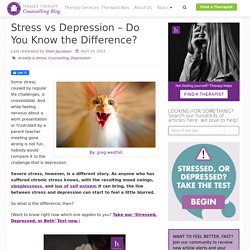
And while feeling nervous about a work presentation or frustrated by a parent teacher meeting gone wrong is not fun, nobody would compare it to the challenge that is depression. Severe stress, however, is a different story. As anyone who has suffered chronic stress knows, with the resulting mood swings, sleeplessness, and low of self-esteem it can bring, the line between stress and depression can start to feel a little blurred. So what is the difference, then? [Want to know right now which one applies to you? 11 Physical Signs Of Stress. Everyone gets stressed.
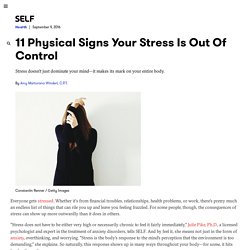
Whether it's from financial troubles, relationships, health problems, or work, there's pretty much an endless list of things that can rile you up and leave you feeling frazzled. For some people, though, the consequences of stress can show up more outwardly than it does in others. "Stress does not have to be either very high or necessarily chronic to feel it fairly immediately," Julie Pike, Ph.D., a licensed psychologist and expert in the treatment of anxiety disorders, tells SELF. And by feel it, she means not just in the form of anxiety, overthinking, and worrying. "Stress is the body’s response to the mind’s perception that the environment is too demanding," she explains. Stress activates your sympathetic nervous system. Here are 11 of the most common physical signs your stress levels are too damn high. Stress Effects - The American Institute of Stress. Coping with stress at work.
Everyone who has ever held a job has, at some point, felt the pressure of work-related stress.
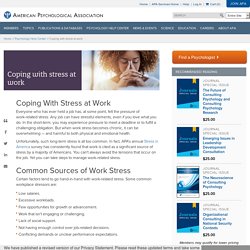
Any job can have stressful elements, even if you love what you do. In the short-term, you may experience pressure to meet a deadline or to fulfill a challenging obligation. 16 Simple Ways to Relieve Stress and Anxiety. Stress and anxiety are common experiences for most people.
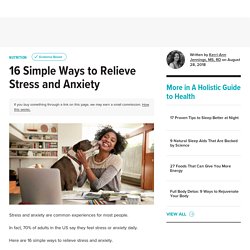
In fact, 70% of adults in the US say they feel stress or anxiety daily. Here are 16 simple ways to relieve stress and anxiety. Exercise is one of the most important things you can do to combat stress. Behavioral Strategies for Coping with Stress - CMC. Ever wonder why it’s so hard to change a behavior?

Maybe you really want to quit smoking, or drinking, or overeating and you have a long list of reasons why changing feels like an important thing to do (“I’ll be healthier”, “my wife won’t be angry at me when I come home”, “I’ll be more productive in the mornings”). And then, in spite of your best intentions, you find yourself turning back to the old behavior. There are many complex reasons why changing a long-standing behavior pattern can be hard to do. Stress Management Techniques. By Saul McLeod, published 2015 Stress arises when individuals perceive a discrepancy between the physical or psychological demands of a situation and the resources of his or her biological, psychological or social systems (Sarafino, 2012).
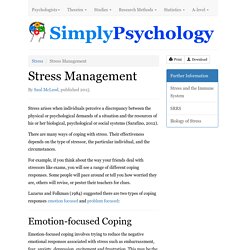
There are many ways of coping with stress. Their effectiveness depends on the type of stressor, the particular individual, and the circumstances. For example, if you think about the way your friends deal with stressors like exams, you will see a range of different coping responses. Some people will pace around or tell you how worried they are, others will revise, or pester their teachers for clues. Lazarus and Folkman (1984) suggested there are two types of coping responses emotion focused and problem focused: Emotion-focused Coping.